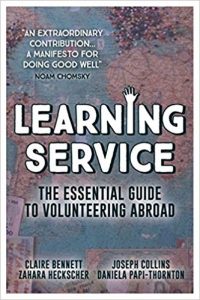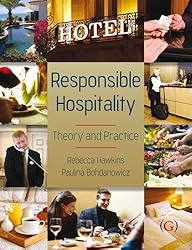Responsible Travel Books, Guides and Resources
Over the last decade, responsible travel, tourism and hospitality subjects have increasingly been implemented in schools and university curriculum. We think this is a move in the right direction, but, in our opinion, responsible travel and tourism is not only for academics. In fact, we believe local, authentic and responsible travel can provide some of the best travel experiences. Travel publishers like Lonely Planet, Rough Guides and Footprint all include sections on responsible travel tips in their latest publications. We also find it very useful to read up on the destinations we’re visiting, and below is a selection of books on Responsible Travel, Tourism and Hospitality as well as destination specific books that we find useful before, during or after travel in the Mekong region and beyond.
We appreciate that there are many books and resources out there, so please do let us know if your favourite book about responsible travel is not listed and you think we should we should include it on our list. – Thank you!
See also our Ideas Lists at amazon.co.uk and amazon.com for ideas and books about the culture, history, food and people in the Mekong region.
Responsible travel guides
Reading up on the destination you’re visiting before you travel makes you appreciate the culture, history, customs and legends, and below are some general travel guides and books about the different countries in the Mekong Region.
 Clean Breaks: 500 New Ways to See the World
Clean Breaks: 500 New Ways to See the World
Richard Hammond and Jeremy Smith
Rough Guides (2009)
 The Good Alternative Travel Guide: Exciting Holidays for Responsible Travellers: Exciting Holidays for Responsible Travelers
The Good Alternative Travel Guide: Exciting Holidays for Responsible Travellers: Exciting Holidays for Responsible Travelers
Mark Mann, Zainem Ibrahim
Routledge; 2 edition (2002)
If you’re bored with the same old package tours and identikit resorts, this book showcases a whole new world of inspirational holidays. Throughout Asia, Africa, the Americas and the Pacific, tribal people and rural villagers are setting up their own tours – and they want you to visit. These holidays are often a better alternative. Better for you, with real insights into local life and culture in some of the most beautiful places on earth; better for the people you visit, leaving them with more money and supporting local development projects; and better for the environment, offering sustainable alternative incomes for communities living in threatened ecosystems. Compiled by Mark Mann for Tourism Concern, Europe’s leading ethical tourism organization, this updated version of The Community Tourism Guide is still the only guide to this type of holiday. It not only explains the principles of ‘community-based tourism’, but also lists hundreds of guesthouses and tours, with full contact details to help you arrange your next holiday.
 To Asia With Love: A Connoisseurs’ Guide to Cambodia, Laos, Thailand and Vietnam
To Asia With Love: A Connoisseurs’ Guide to Cambodia, Laos, Thailand and Vietnam
Kim Fay
Global Directions/Things Asian Press (30 Dec 2004)
With a contribution from Jo on how she fell in love with Cambodia, this book provides a selection of personal experiences from people who have lived, worked and travelled extensively in Cambodia. Laos, Thailand and Vietnam.
Volunteer Tourism
Volunteer Tourism: Experiences That Make a Difference
Stephen Wearing
CABI Publishing (12 Oct 2001)
Volunteer tourism has increased in popularity over the last decade and this book describes a field of tourism, in which travellers visit a destination and take part in projects in the local community. Projects are commonly nature-based, people-based or involve restoration of buildings and artefacts (e.g. restoration of a Buddhist temple in Mongolia). It provides an overview of the phenomenon of volunteer tourism, its sources and its development as a concept. Contemporary volunteer tourism has tended to suffer from a lack of differentiation from other forms of tourism or volunteering, falling into areas such as alternative tourism, international volunteering, social work and conservation corps work. The aim of this book is to provide it with a more specific identity. The book focuses on the potential positive social and environmental benefits of volunteer tourism, and the prerequisites for a successful experience.
Adventures Less Ordinary – How To Travel and Do Good
Edited by Ethan Gelber – ebook
Horizon Travel Press (Feb 2015)
A collection of stories and reflections from people and industry experts including examples of which the generosity of travellers can be harnessed in beneficial ways. Or, as Ethan puts it, ‘this is the definitive handbook for compassionate people seeking the ultimate adventure – one guided as much by the good you give as the good you get’.
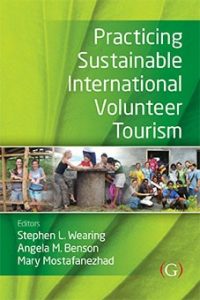 Practicing Sustainable International Volunteer Tourism
Practicing Sustainable International Volunteer Tourism
Stephen Wearing, Angela Benson, Mary Mostafanezhad
Goodfellow Publishing (Nov 2015)
Practicing Sustainable International Volunteer Tourism provides a uniquely holistic “how to guide” for the practice of sustainable international volunteer tourism which incorporates contextual as well as practical advice for primary stakeholders including communities, practitioners, governments and volunteer tourists.
With an increased focus on the impacts of international volunteer tourism, this book is a very useful read for all those studying and working in the tourism industry as well as not for profits, commercial operators, International and National NGOs, government agencies, communities and international volunteer tourists themselves.
The  Idealist.org Handbook to Building a Better World: How to Turn Your Good Intentions Into Actions That Make a Difference
Idealist.org Handbook to Building a Better World: How to Turn Your Good Intentions Into Actions That Make a Difference
Part career guide, part activist’s handbook, The Idealist.org Handbook to Building a Better World provides tools and inspiration for anyone who wants to make a difference but doesn’t know where to start. Inspired by Idealist.org’s 600,000-member online community and their ongoing search for work that gives back to the world, this practical reference walks readers through the different ways they can get involved and the range of possibilities for applying one’s interests and skills to meet their community’s needs. Idealist.org’s staff gives a comprehensive understanding of the issues, options, organisations,and resources so readers can be proactive, whether it’s through their current job, volunteering, donating, personal spending, board service, starting an organisation or changing careers.
Cambodia
After decades of conflicts and civil war, Cambodia has emerged as one of the fastest growing tourist destinations in Southeast Asia. With the truly amazing temples of Angkor, islands and beaches, a myriad of culinary delights, an excellent choice of accommodation ranging from locally owned guesthouses to award-winning boutique hotels, and friendly, welcoming people, it’s easy to understand why Cambodia has become such a popular destination.
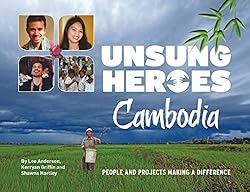 Unsung Heroes Cambodia: People and Projects Making a Difference
Unsung Heroes Cambodia: People and Projects Making a Difference
Lee Anderson, Kerryan Griffin and Shawna Hartley
Unsung Heroes (2013)
Unsung Heroes Cambodia is a collection of 60 short stories that highlights local community projects providing inspiration and practical tips for aspiring ‘do-gooders’. There is a dedicated section on volunteering and ethical considerations and complex issues are raised in addition to providing direct links to projects.
 How To Help In Cambodia: An eBook Guide for Volunteers, Donors and Travellers
How To Help In Cambodia: An eBook Guide for Volunteers, Donors and Travellers
Lee Anderson, Kerryan Griffin and Shawna Hartley
Unsong Heroes (2013) – eBook Amazon Digital Services, Inc
A practical guide for potential volunteers that raises awareness of the complex issues and ethics surrounding those that want to help in any country. The eBook also includes inspirational short stories on over 40 NGOs that are making a difference in Cambodia – from education, health care and basic human rights to protecting the wildlife, environment and sustainable ecotourism – along with direct links to their websites. An important tool for any traveller wanting to find clear, concise information on how best to help.
 First They Killed My Father: A Daughter of Cambodia Remembers
First They Killed My Father: A Daughter of Cambodia Remembers
Loung Ung
Mainstream Publishing; New Ed edition (17 Sep 2001)
Until the age of five, Loung Ung lived in Phnom Penh, one of seven children of a high-ranking government official. She was a precocious child who loved the open city markets, fried crickets, chicken fights and being cheeky to her parents.
When Pol Pot’s Khmer Rouge army stormed into Phnom Penh in April 1975, Loung’s family fled their home and were eventually forced to disperse to survive. Loung was trained as a child soldier while her brothers and sisters were sent to labour camps. The surviving siblings were only finally reunited after the Vietnamese penetrated Cambodia and started to destroy the Khmer Rouge.
Bolstered by the bravery of one brother, the vision of the others and the gentle kindness of her sister, Loung forged on to create for herself a courageous new life.
First They Killed My Father is an unforgettable book told through the voice of the young and fearless Loung. It is a shocking and tragic tale of a girl who was determined to survive despite the odds.
Cambodia’s Curse
Joel Brinkley
PublicAffairs (2012)
A generation after the Khmer Rouge, Cambodia shows every sign of having overcome its history – the streets of Phnom Penh are paved; skyscrapers dot the skyline. But under this façade lies a country still haunted by its years of terror. Joel Brinkley won a Pulitzer Prize for his reporting in Cambodia on the fall of the Khmer Rouge regime that killed one quarter of the nation’s population during its years in power. In 1992, the world came together to help pull the small nation out of the mire. Cambodia became a United Nations protectorate (UNTAC) – the first and only time the UN tried something so ambitious. What did the new, democratically-elected government do with this unprecedented gift? In 2008 and 2009, Brinkley returned to Cambodia to find out. He discovered a population in the grip of a venal government. He learned that one-third to one-half of Cambodians who lived through the Khmer Rouge era have post-traumatic stress disorder (PTSD) – and its afflictions are being passed to the next generation. His extensive close-up reporting in Cambodia’s Curse illuminates the country, its people, and the deep historical roots of its modern-day behaviour.
Responsible Travel Guide Cambodia
Pujita Nanette Mayeda, Friendship With Cambodia
Wild Iris Press (2010)
Responsible Travel Guide Cambodia provides tourists and travellers with the resources they need to have an enjoyable and meaningful vacation that supports local people and projects in Cambodia. The book lists a selection of hotels and accommodation options to suit everyone’s comfort preferences and budget. It offers a section of restaurants ranging from gourmet to vegetarian and from coffee shops to traditional Cambodian cuisine as well as fair-trade craft shops that with various training and employment programs for landmine survivors, women and the rural poor. Travellers wanting to volunteer in Cambodia will find a few things to consider and potential pitfalls one should be aware of. The book also addresses some of the issues related to begging children, sex-tourism and how caring tourists can help protect children.
 Angkor: Cambodia’s Wondrous Khmer Temples
Angkor: Cambodia’s Wondrous Khmer Temples
Dawn Rooney
Odyssey Publications, 6 edition (2011)
This title features Foreword by His Majesty King Norodom Sihamoni of Cambodia. It contains extensive accounts of all temples and pre-Angkor sites including Preah Vihear and the most recent restoration at Banteay Chhmar. It is written by an art historian steeped in the region’s art and culture. It offers comprehensive background information on Khmer art, religion and cultural traditions. It covers unique flora and fauna around the Great Lake, Tonle Sap. It profiles the Phnom Penh National Museum and highlights of Cambodia’s capital; and the hip town Siem Reap – the base for exploring Angkor. It also includes a monument-by-monument guide to the sites with detailed maps and plans, plus information about four temple complexes accessible by helicopter.
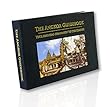 The Angkor Guidebook: Your Essential Companion to the Temples
The Angkor Guidebook: Your Essential Companion to the Temples
Andrew Booth
The Angkor Guidebook (Oct 2014)
Designed specifically for the first-time visitor to Angkor, this definitive guide will bring the Angkor temples to life with 19 artistic recreations to show what these ruined temples would have looked like in their heyday, reflecting as closely as possible the latest academic research. Who hasn’t wandered ancient ruins and tried to imagine how these sites would have looked in their heyday? This guidebook goes one step further, exploring the people, and culture, and lifestyles of this medieval civilization, bringing the subject matter to life before you eyes. The book was conceived by Andrew Booth, resident of Siem Reap and leading travel specialist to Cambodia, specifically to accompany the first-time visitor to Angkor who typically spends two or three days exploring the temples of the archaeological park.
Lonely Planet Cambodia (Travel Guide)
Nick Ray
Lonely Planet; 10 edition (10 Aug 2018)
Lonely Planet’s resident author Nick Ray is very knowledgeable and Lonely Planet Cambodia covers the must-see spots and includes sections on volunteering and issues regarding giving money to begging children. It’s popularity can, however, also be a bit of a drawback so we would recommend travellers to take it for what it is (and a good one at that…!!), but do also make sure to leave it behind sometimes. Buy it, bring it, but do not follow it blindly… Meet up with local people and get off the beaten tracks to explore, learn and understand more of the culture and traditions of this beautiful country.
The Rough Guide to Cambodia
Rough Guides, Gavin Thomas
Rough Guides; 6 edition (2017)
 DK Eyewitness Travel Guide: Cambodia & Laos
DK Eyewitness Travel Guide: Cambodia & Laos
DK Publishing
Dorling Kindersley (1 July 2013)
 Cambodia Footprint Handbook
Cambodia Footprint Handbook
Andrew Spooner
Footprint Handbooks; 7th Revised edition (19 Jan 2015)
Myanmar (Burma)
After having been considered ‘off limits’ and travellers being encouraged not to visit Myanmar (Burma) for decades, borders have opened up for tourism and many people have discovered that the country has a lot to offer travellers. Thousands of temples scattered around the countryside in Bagan; floating villages and gardens in Inle Lake and the majestic Ayeyarwady and the Chindwin rivers are all main draws, but we believe it is very useful and important to read up about the history and political situation in the country.
 Under the Dragon: A Journey Through Burma
Under the Dragon: A Journey Through Burma
Rory MacLean
I B Tauris & Co Ltd; Reprint edition (2012)
What does the fortunate visitor feel, travelling among the betrayed? The memory of a brief visit to Burma had haunted Rory MacLean for years. A decade after the violent suppression of an unarmed national uprising, which cost thousands of lives and all hopes for democracy, he seized the chance to return. Travelling from Rangoon to Mandalay and Pagan, into the heart of the Golden Triangle, he hears stories of freedom fighters, government censors, basket weavers, farmers and lovers – ordinary people struggling to survive under one of the most brutal and repressive regimes in the world. He also meets Aung San Suu Kyi, perhaps the most courageous woman of our time and the embodiment of all Burma s hope. On his journey MacLean exposes the tragedy of a hundred betrayals, giving voice to those too frightened to speak for themselves. In so doing he illuminates a land of paradoxes woven together like a basket: love and hate, faith and hopelessness, freedom and slavery, kindness and cruelty, selflessness and greed. ‘Under the Dragon’ is a perceptive and heartbreaking portrayal of contemporary Burma, a country that is shot through with desperation and fear, but also blessed – even in the darkest places – with beauty and courage.
 Burmese Days (Penguin Modern Classics)
Burmese Days (Penguin Modern Classics)
George Orwell
Penguin Classics (29 Nov 2001)
George Orwell’s first novel, inspired by his experiences in the Indian Imperial Police in Burma, Burmese Days includes a new introduction by Emma Larkin in Penguin Modern Classics.
Based on his experiences as a policeman in Burma, George Orwell’s first novel presents a devastating picture of British colonial rule. It describes corruption and imperial bigotry in a society where, ‘after all, natives were natives – interesting, no doubt, but finally … an inferior people’. When Flory, a white timber merchant, befriends Indian Dr Veraswami, he defies this orthodoxy. The doctor is in danger: U Po Kyin, a corrupt magistrate, is plotting his downfall. The only thing that can save him is membership of the all-white Club, and Flory can help. Flory’s life is changed further by the arrival of beautiful Elizabeth Lackersteen from Paris, who offers an escape from loneliness and the ‘lie’ of colonial life.
 From The Land of Green Ghosts: A Burmese Odyssey
From The Land of Green Ghosts: A Burmese Odyssey
Pascal Khoo Thwe
Flamingo (3 Mar 2003)
The astonishing story of a young man’s upbringing in a remote tribal village in Burma and his journey from his strife-torn country to the tranquil quads of Cambridge.
In lyrical prose, Pascal Khoo Thwe describes his childhood as a member of the Padaung hill tribe, where ancestor worship and communion with spirits blended with the tribe’s recent conversion to Christianity. In the 1930s, Pascal’s grandfather captured an Italian Jesuit, mistaking him for a giant or a wild beast; the Jesuit in turn converted the tribe. (The Padaung are famous for their ‘giraffe women’ – so-called because their necks are ritually elongated with ornamental copper rings. Pascal’s grandmother had been exhibited in a touring circus in England as a ‘freak’.)
Pascal developed a love of the English language through listening to the BBC World Service, and it was while working as a waiter in Mandalay to pay for his studies that he met the Cambridge don John Casey, who was to prove his saviour. The brutal military regime of Ne Win cracked down on ‘dissidents’ in the late 1980s.
Pascal’s girlfriend was raped and murdered by soldiers, and Pascal took to the jungle with a guerrilla army. How he was eventually rescued with Casey’s help is a dramatic story, which ends with his admission to Cambridge to study his great love, English literature.
 The River of Lost Footsteps: A Personal History of Burma
The River of Lost Footsteps: A Personal History of Burma
Thant Myint-U
Faber & Faber (2008)
Drawing both on his own family’s stories and his years of hands-on political experience working with the United Nations, Thant Myint-U has written an illuminating account of how Burma’s rich past informs its violent present, and of how the world might transform the country’s future.
In The River of Lost Footsteps, Thant Myint-U tells the story of modern Burma, in part through a telling of his own family’s history, in an interwoven narrative that is by turns lyrical, dramatic, and appalling. His maternal grandfather, U Thant, rose from being the schoolmaster of a small town in the Irrawaddy Delta to become the UN secretary-general in the 1960s. And on his father’s side, the author is descended from a long line of courtiers who served at Burma’s Court of Ava for nearly two centuries. Through their stories and others, he portrays Burma’s rise and decline in the modern world, from the time of Portuguese pirates and renegade Mughal princes through the decades of British colonialism, the devastation of World War II, a sixty-year civil war, military repression and the emergence of Nobel Prize laureate Aung San Suu Kyi.
The River of Lost Footsteps is a work both personal and global, a distinctive contribution that makes Burma accessible and enthralling. Thant Myint-U is the author of Where China Meets India and has written articles for the New York Times, the Washington Post and the New Statesman.
 Letters From Burma
Letters From Burma
Aung San Suu Kyi
Penguin; Re-issue edition (4 Feb 2010)
In these astonishing letters, Aung San Suu Kyi reaches out beyond Burma’s borders to paint for her readers a vivid and poignant picture of her native land.
Here she celebrates the courageous army officers, academics, actors and everyday people who have supported the National League for Democracy, often at great risk to their own lives. She reveals the impact of political decisions on the people of Burma, from the terrible cost to the children of imprisoned dissidents – allowed to see their parents for only fifteen minutes every fortnight – to the effect of inflation on the national diet and of state repression on traditions of hospitality. She also evokes the beauty of the country’s seasons and scenery, customs and festivities that remain so close to her heart.
Through these remarkable letters, the reader catches a glimpse of exactly what is at stake as Suu Kyi fights on for freedom in Burma, and of the love for her homeland that sustains her non-violent battle.
 The Glass Palace
The Glass Palace
Amitav Gosh
Flamingo (2002)
Beginning in 1885, with the British invasion of Mandalay and the capture of the Burmese king and queen, and encompassing over 100 years to modern-day India and Burma (Myanmar), Amitav Ghosh has created in The Glass Palace a monument to life in colonial central and Southeast Asia. The story follows three generations from three families, spreading its wings across the world, from Malaya to New York. Yet despite the epic scale, the gentle and intimate detail of the characters and their interwoven relationships removes any need for an understanding of this area of the world in geographical or historical terms. The map at the back of the book is useful for following the characters’ travels as their fortunes and rulers (British, Japanese, military government) change, but it is the atmosphere and feel of the era and location that Ghosh captures astutely. Each city or border is not a mark on a map with political significance but a home, a memory and a reality.
 Burma Chronicles
Burma Chronicles
Guy Delisle
Jonathan Cape (2011)
 The Trouser People
The Trouser People
Andrew Marshall
River Books; Reprint edition (2012)
 Finding George Orwell in Burma
Finding George Orwell in Burma
Emma Larkin
Granta Books (2011)
 Lonely Planet Myanmar (Burma)
Lonely Planet Myanmar (Burma)
Simon Richmond, Austin Bush, David Eimer, Mark Elliott, Nick Ray
Lonely Planet; 12 edition (18 July 2014)
 Insight Guides: Myanmar (Burma)
Insight Guides: Myanmar (Burma)
David Abram
Insight; 9 edition (1 Mar 2013)
 DK Eyewitness Travel Guide Myanmar (Burma)
DK Eyewitness Travel Guide Myanmar (Burma)
Dorling Kindersley (1 Oct 2014)
Responsible Travel, Tourism and Hospitality Textbooks
Whether you’re studying Travel and Tourism or if you’re interested in Responsible Travel, Tourism and Hospitality, below are some essential text books and general books about green and responsible travel.
Responsible Hospitality: Theory and Practice
Rebecca Hawkins, Paulina Bohdanowicz
Goodfellow Publishers (2011)
The first book to bring together environmental theory and the responsible hospitality debate to define how far the industry has gone and what is left to achieve. It provides a genuine critique of the range of methods used so far and of the challenges that lie ahead to enable a true ‘sustainable development.’
 Sustainable Tourism and The Millennium Development Goals: Effecting Positive Change
Sustainable Tourism and The Millennium Development Goals: Effecting Positive Change
Kelly Bricker, Rosemary Black, Stuart Cottrel
Jones and Bartlett; 1 edition (21 Sep 2012)
Endorsed by The International Ecotourism Society, Sustainable Tourism & The Millennium Development Goals: Effecting Positive Change demonstrates how ecotourism and sustainable tourism can assist in supporting and meeting the goals set forward by the Millennium Development Goals (MDG) and how it can foster a global partnership for development. The text discusses how ecotourism and sustainable tourism can assist in supporting and meeting the MDG by drawing on case studies and examples. The final summary chapter discusses how ecotourism and sustainable tourism can assist in supporting and meeting the MDG by 2015 and identifies the challenges and goals that need to be considered in the future. In this edition you will find: * Historical perspective of the development of ecotourism and sustainable tourism * The Millennium Development Goals defined * Overview of how ecotourism and sustainable tourism can assist in meeting the goals of the MDG * Engaging case studies and examples to reinforce the concept
 Ecotourism and Sustainable Development: Who Owns Paradise?
Ecotourism and Sustainable Development: Who Owns Paradise?
Martha Honey
Island Press; 2nd Revised edition edition (2008)
Around the world, ecotourism has been hailed as a panacea: a way to fund conservation and scientific research, protect fragile ecosystems, benefit communities, promote development in poor countries, instill environmental awareness and a social conscience in the travel industry, satisfy and educate discriminating tourists, and, some claim, foster world peace. Although “green” travel is being aggressively marketed as a “win-win” solution for the Third World, the environment, the tourist, and the travel industry, the reality is far more complex, as Martha Honey reports in this extraordinarily enlightening book.”Ecotourism and Sustainable Development”, originally published in 1998, was among the first books on the subject. For years it has defined the debate on ecotourism: Is it possible for developing nations to benefit economically from tourism while simultaneously helping to preserve pristine environments? This long-awaited second edition provides new answers to this vital question.” Ecotourism and Sustainable Development” is the most comprehensive overview of worldwide ecotourism available today, showing how both the concept and the reality have evolved over more than twenty-five years. Here Honey revisits six nations she profiled in the first edition – the Galapagos Islands, Costa Rica, Tanzania, Zanzibar, Kenya, and South Africa – and adds a fascinating new chapter on the United States. She examines the growth of ecotourism within each country’s tourism strategy, its political system, and its changing economic policies. Her useful case studies highlight the economic and cultural impacts of expanding tourism on indigenous populations as well as on ecosystems.Honey is not a “travel writer.” She is an award-winning journalist and reporter who lived in East Africa and Central America for nearly twenty years. Since writing the first edition of this book, she has led the International Ecotourism Society and founded a new center to lead the way to responsible ecotourism. Her experience and her expertise resonate throughout this beautifully written and highly informative book.
 Responsible Tourism: Concepts, Theory and Practice
Responsible Tourism: Concepts, Theory and Practice
David Leslie
CABI Publishing (2012)
Tourism is one of the world’s biggest industries. Responsible tourism is concerned with the effects of tourism on people, ecology, and communities, and seeks to ameliorate these impacts by providing tourism which benefits host communities, improves working conditions, involves the local community, promotes cultural heritage, and benefits the environment. This book discusses responsible tourism as a whole, including the politics, policy and planning behind it, and the major subject sub-topics, such as poverty reduction, the environment, transport, governance, wildlife tours and heritage. It is suitable for university libraries, policy makers and researchers in responsible and sustainable tourism.
 An Introduction to Tourism and Anthropology
An Introduction to Tourism and Anthropology
Peter Burns
Routledge (1999)
This introductory text explains how anthropology is integral to the study of tourism dynamics. Starting with an overview of the development of anthropology as a social science, the author uses a wealth of international examples, including the UK, USA and Australia, to bring practical relevance to complex theories. With its lucid writing style, summaries, sample questions and suggestions for further reading, this book will be an invaluable teaching resource in this area.
 Taking Responsibility for Tourism
Taking Responsibility for Tourism
Harold Goodwin
Goodfellow Publishers; 1 edition (2011)
Taking Responsibility for Tourism is about the globally vital necessity of realising sustainable tourism. It is a hugely important challenge to those who organise and sell travel and tourism, and those who consume it. Responsible tourism is not a niche product; major trade associations and large and small tour operators are committing to the objectives of responsible tourism and shouldering their responsibilities. This powerful new book is the most authoritative contemporary overview of the key issues that are critical for the future progress of responsible tourism, written by one of the leading thinkers and changemakers in the field. It applies the broader concepts of responsibility to travel and tourism, and looks at how they relate to the overarching issues of greening business and making the business case for responsibility.
 Sustainable Tourism: A Marketing Perspective
Sustainable Tourism: A Marketing Perspective
Rebecca Hawkins, Victor T.C. Middleton
Routledge (1998)
Looking ahead to the 21st century, Sustainable Tourism explains the current thinking process that underlies the emerging international principles of more sustainable development in travel and tourism.
Using international illustrations it draws on experience and good practice as they are being increasingly applied around the world in the late 1990s. In sharp contrast to the problem analysis approach adopted by so many authors to this subject, this book is focused on the pro-active role the private sector industry can play in partnership with the public sector to achieve solutions through its day-to-day operations and marketing, expecially in product enhancement and quality controls.
 Sustainable Tourism: A Global Perspective
Sustainable Tourism: A Global Perspective
Rob Harris (Editor), Tony Griffin and Peter Williams
Routledge; 2 edition (2002)
Sustainable Tourism is vital reading for anyone seeking to understand the complexities associated with sustainable tourism development, and how government and industry have responded to the challenges the concept poses. The major areas addressed in this edited volume are:
- perspectives and issues associated with the concept of sustainable tourism development
- accreditation, education and interpretation, including specific examples such as Green Globe 21, the European Blue Flag Campaign and the WWF’s PAN Parks Programme
- sustainable tourism case studies of tourist destination regions, natural areas and tourism enterprises drawn from Africa, Australia, the South Pacific, North America, South-east Asia and the Caribbean
An impressive international editorial team has combined to present in this text not only a variety of perspectives on sustainable tourism development, but also significant insights into barriers, challenges and current industry and government responses to it in various parts of the globe. ‘Sustainable Tourism’ will be a welcome addition to the libraries of tourism industry professionals, individuals involved in the management of natural areas; tourism policy makers; tourism academics; and students with an interest in the future sustainability of tourism and the industry that supports it.
 Responsible Tourism and CSR: Assessment Systems for Sustainable Development of SMEs in Tourism
Responsible Tourism and CSR: Assessment Systems for Sustainable Development of SMEs in Tourism
Mara Manente, Valeria Minghetti, Erica Mingotto
Springer; 2014 edition (2014)
What are Responsible Tourism and Corporate Social Responsibility? What is the industry’s awareness regarding these concepts? What are the systems and tools currently available on the market that tourism SMEs can use to assess their engagement and the sustainability of their business?
This book is aimed at replying to these questions and offering an innovative contribution to the current debate in the field. After having defined Responsible Tourism and CSR and the environment in which these methodologies develop, the authors present and compare the main European assessment and certification systems, describe their characteristics and functionalities and discuss the relevant issues concerning their application.
Other books and misc reading
 The Gringo Trail: A Darkly Comic Road Trip through South America
The Gringo Trail: A Darkly Comic Road Trip through South America
Mark Mann
Summersdale (2014)
‘… there I was in the middle of Bogotá, coked up to my eyeballs, in a hallway holding two machetes, while some drunk Colombians argued about whether or not to blow up a bar with a live hand grenade…’ Asia has the hippie trail. South America has the gringo trail. Mark Mann and his girlfriend Melissa set off to explore the ancient monuments, mountains and rainforests of South America. But for their friend Mark, South America meant only one thing: drugs. Sad, funny and shocking, The Gringo Trail is an On the Road for the Lonely Planet generation – a darkly comic road-trip and a revealing journey through South America’s turbulent history. Drama and discovery. Culture and cocaine. Fact is stranger than fiction
Responsible Tourism and Travel Links, downloads and PDFs
 Responsible Travel Handbook
Responsible Travel Handbook
Transitions Abroad (edt)
Transitions Abroad (2006)
The Responsible Travel Handbook is a compilation of articles and useful resources that will help travellers better understand some of the concepts related to responsible travel.
 Travelers’ Philanthropy Handbook
Travelers’ Philanthropy Handbook
Martha Honey (edt) / Center for Responsible Travel (CREST)
Center for Responsible Travel (2011)
This useful handbook covers the principles, origins and growth of travellers’ philanthropy, includes original essays and case studies, and offers practical ‘how to’ advice, do’s and don’ts, and best practices for businesses, community organizations, and travellers interested in developing or participating in travel ‘give back’ programs.
Adventures Less Ordinary – How To Travel and Do Good
Edited by Ethan Gelber – ebook
Horizon Travel Press (Feb 2015)
A collection of stories and reflections from people and industry experts including examples of which the generosity of travellers can be harnessed in beneficial ways. Or, as Ethan puts it, ‘this is the definitive handbook for compassionate people seeking the ultimate adventure – one guided as much by the good you give as the good you get’.

